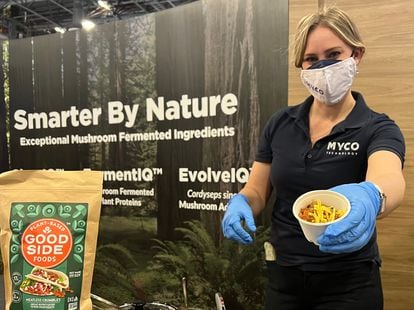Jessie Booth of MycoTechnology at CES in Las Vegas.IR
From "bleeding" burgers to sausages,
nuggets
and meatballs that do not come from animals.
Plant and mushroom-based meat-mimicking products are reshaping the food industry.
The CES, the largest consumer electronics fair in the world, opens this year an area dedicated exclusively to food technology.
Taking a walk through this area is like delving into what the future of food may hold for us.
CES, which takes place this year from January 5-7 in Las Vegas, is often a prelude to some of the technologies that will dominate the future. The food technology market share is expected to exceed $ 342 billion by 2027, according to the CTA. The association of US technology companies, which organizes the event, indicates that this trend will increase as "the demand for access to cheaper, healthier and safer food products grows."
“I think that in the future neither animals nor plants will be needed. In the end, it all comes down to chemistry, to the atoms that make up any food, and you can rebuild that ”, says José María Elorza, financial director of Moa FoodTech. This Spanish company uses waste from the food industry, which is normally thrown away or fed to animals, to generate new ingredients that are then sold back to food producers. These ingredients are modulated with different technologies so that later they can be used "to make meat analogs, vegetable drinks,
snacks
or even beer."
In 2020 alone, more than $ 17 billion was invested in food technology solutions, according to the CTA, citing data from Food Tech Data Navigator. In recent years, multiple companies have turned to technology to recreate the taste and texture of meat. Impossible Foods aims to eliminate the need for animals in the food chain by 2035. If in 2019 it surprised at CES with a “bleeding” hamburger, now it is trying to develop plant-based foods similar to chicken, seafood, milk or eggs . The company has a value of more than 4,000 million dollars, with meat substitutes in large chains such as Burger King or Starbucks.
Susana Sánchez, scientific director of Moa Foodtech, explains that meat is difficult to imitate due to the textures.
According to account, there are those who look for in the mushrooms the key to obtain it.
This is the case of Meati Foods, Ecovative or MycoTechnology.
The latter company uses a mushroom-based fermented rice and pea protein blend to create meat analogs, dairy alternatives, or protein drinks.
EL PAÍS has tested a meat substitute made with this vegetable protein and its texture is quite similar to meat.
Towards a more sustainable diet
All these companies agree that this type of product and a change in the food model will be necessary in the future. "If the population grows from about 8 billion people today to 10 billion in 2050, we are going to need 70% more food, including meat," says Jim Ellis of MycoTechnology. The meat of vegetable origin, according to the expert, will serve to cope with the increase in demand.
To this is added that now people "pay more attention to what they are putting into their body." Several studies indicate that both red meat and processed meat are linked to an increased risk of some types of cancer. The World Health Organization calls red meat "probably carcinogenic" and maintains that there is sufficient evidence that eating processed meat causes colorectal cancer. In this context, some organizations such as the World Cancer Research Fund (WCRF) advise limiting the consumption of both types of meat.
Bosco Emparanza, CEO of Moa FoodTech, believes that meat will continue to be consumed in the future. But he maintains that there is a movement to replicate it with nutritious and, above all, sustainable proteins. The expert underlines the great environmental impact of the agri-food industry: "In addition to causing a large part of deforestation, it emits a large amount of greenhouse gases, and industry and society know it." Food production generates a third of global greenhouse gas emissions, according to a study published in
Nature Food
. This situation "has led a part of the population to change their consumption habits and the industry to seek alternative solutions."
Moa FoodTech is still in a technology development phase and has not yet launched into mass production of its ingredients. Its creators have already carried out projects with large companies such as Barilla and claim to be holding conversations with companies around the world: from one of the largest food producers in the Philippines to large meat companies in Spain, such as Campofrío.
Despite the enormous potential of these new, more sustainable foods, an ambitious goal still needs to be achieved: to captivate the masses.
Elorza believes that the consumer still has a certain aversion to eating food that has been produced in a laboratory, although he insists that this trend is changing.
In addition, producing this type of food can be expensive: “Like any production process, until you acquire economies of scale, the cost is not reduced.
Obtaining soy protein a few years ago was very expensive, but today it is very cheap ”.
You can follow EL PAÍS TECNOLOGÍA on
and
or sign up here to receive our
weekly newsletter
.

